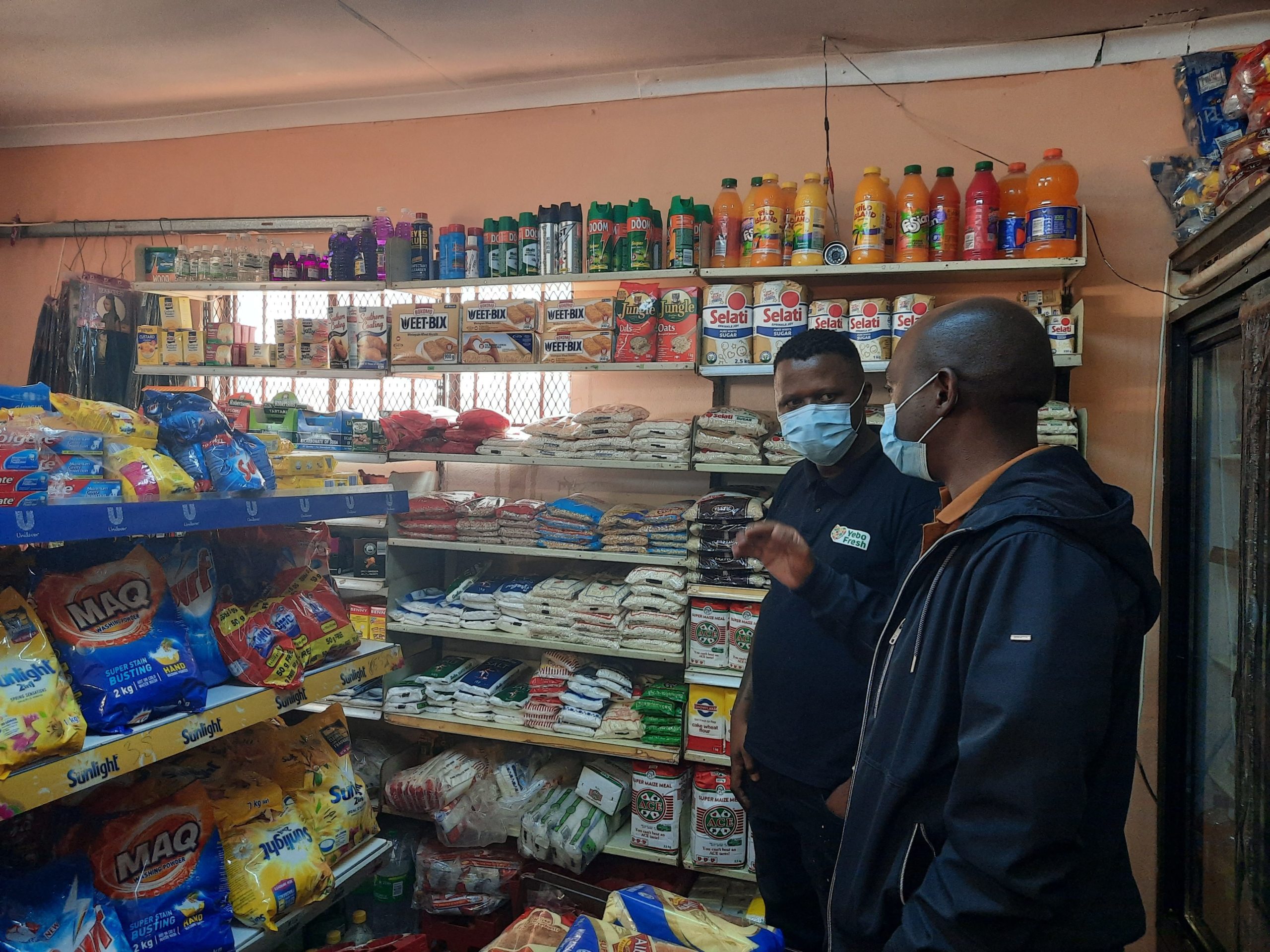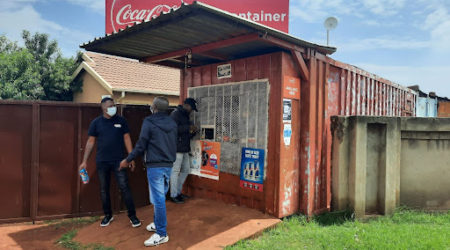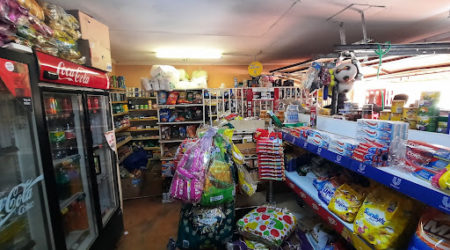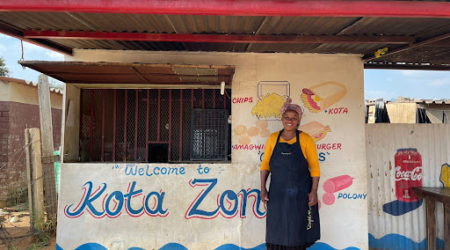How credit can unlock growth and contribute to the financial health of spazas in South Africa’s informal economy

Digital Spazas credit interventions
During the first phase of the Digital Spazas program, we quickly learned how important credit is to their businesses and to the financial health and growth potential of the spazas they serve. Moreover, all three innovators offered digital solutions that generate useful data on transactions and interactions with spazas that can be leveraged for the design and delivery of tailored credit products.
In the second phase of the program, we focused on the credit opportunity through:
- Demand research with 100 spazas to better understand their financial needs and barriers to access
- Working with Vuleka and Yebo Fresh to develop and formally deploy new stock credit offerings
- Supporting A2Pay in scaling their existing credit products.
In this post, we share insights from the spaza research, highlighting why we explored credit interventions, the mechanisms we used, the results achieved, and lessons learned from the credit pilots with the three fintech innovators.
Stock on payment terms is a high priority
- Cash management can be a massive headache for spazas. As with many small trading businesses, spazas tie up their limited capital in inventory that sits on the shelves until purchased by an end customer. Moreover, most spazas blend their personal and business finances, pulling and pushing in either direction as required. For instance, we found that only 38 out of 100 spazas we interviewed separate theirr personal expenses from their business expenses.
- There was also a strong demand for accessing stock on payment terms through both our demand research and the feedback that both Vuleka and Yebo Fresh received from their customers. This stock credit, or “stock on terms,” is the ability to access inventory on, let’s say, a Monday and pay for the batch at the end of the day or in a couple of days. This delay in payment allows the shop to bring in the inventory and sell it without having to tie up their own limited capital. In fact, it may be the biggest “credit” need in the market as it cuts across spaza shop sizes, owner nationality, and gender.
- Through our demand research, we learned that spazas have a need to access about R12,000 in stock each week, with an ideal repayment term of 7-15 days. One-third of the spazas we spoke to access some form of stock on terms already, typically through an informal buying group (also known as a rotating stocking group) or through a long-standing relationship with a supplier. The other two-thirds of spazas interviewed don’t have access to such an offering.
- As we launched the second phase in 2021, Vuleka and Yebo Fresh noticed that their agents were already informally offering payment terms of a few days to some clients, typically those that had a relationship with the field agent and had a strong track record of purchases. We saw this as an opportunity to formalize those offerings and make them available to others. To make it possible, the Digital Spazas Program provided technical assistance to Yebo Fresh and Vuleka to design their credit products; processes; selection criteria; advised on overall credit strategy and controls; and deployed staff to support the product rollout. We additionally provided a partial guarantee mechanism to derisk the innovators and foster wider rollout for richer insights, as detailed in the section below.
The catalytic power of a small partial guarantee fund
As early-stage fintech ventures, Vuleka and Yebo Fresh are both investing heavily in building out their own field operations and technology to serve spazas, and as such started the second phase with a keen interest to pursue stock on terms for their clients, but with limited cash to dedicate toward the setup and to absorb potential losses. The Digital Spaza program designed a small facility to de-risk the stock on terms offering design and rollout for Vuleka and Yebo Fresh, with the guarantee covering 70% of defaults for a fixed period of time. The pilot was originally designed with a digital escrow model to allow for fast claims processing at a negotiated cost with G-PAY, a payments fintech.
The goal was to enable the two innovators to design and begin offering 5-7 day payment terms to qualifying candidates using internal funds; to deploy this with segments of the market that did not yet have a long track record with the company; and to give the innovator time to learn from field experience and tweak the offering as required without locking up too much in-house capital while the model was developed. By design, on a weekly or monthly basis, the innovators would submit an aged account report showing the stock on terms in default – typically measured as 14 days past the due date – to the guarantee facility for partial reimbursement.

The stock on payment terms offerings have been a big success for both companies in terms of uptake and use of the products. The Yebo Fresh offering, under the name Stock Boost, had about 300 spazas signing up during the 5-month pilot with default rates of less than one percent (1%). The value of stock provided via the stock on terms totaled over ZAR 2,000,000 (about USD 115,000). Post-pilot and by the beginning of November 2022, the number of spazas that had signed up grew by 50%, and the value of stock provided via the product more than doubled to ZAR 5,578,689 (USD 321,206).
Yebo Fresh noted that 50% of spazas increasingly maintained a consistent order frequency after accessing the stock boost product, which is equivalent to increased customer loyalty. Moreover, the average basket size increased by almost 20% compared to the average pre-onboarding basket size. The Stock Boost program is becoming a major sales driver for Yebo Fresh, with word-of-mouth referrals expanding the customer base and spazas feeling more comfortable increasing the total value of their weekly stock orders when they can be partially covered by a buy now pay later offering. Vuleka is also seeing encouraging uptake of up to 10% of its client base, with minimal repayment challenges. Both companies are doubling down on their stock on payment terms programs to make it available to a wider base of customers. They are in the process of formalizing their internal teams and credit processes to manage the growth.
Access to other forms of credit can fuel spaza growth
Through our demand research, we also learned that some growth-oriented spazas have a diverse set of credit needs above and beyond stock on terms. This can include working capital, asset/equipment finance, longer-term loans for store expansion or opening a second shop, etc. We partnered with A2Pay and their Khula Nathi Financial Services company because they already offer many of these loan products to high-performing A2Pay clients and saw a need to leverage data and digital communication tools to scale the uptake of these offerings.
Leveraging insights from the program’s demand research, we focused our collaboration on a few specific areas where we knew spazas were facing obstacles. First, we knew that many shops have a limited understanding of credit as a business tool and have a high fear of formal financial services. Interested shop owners also often lack tools for business projections and have a limited ability to understand how credit might be useful for their business, what it could be used for, and how they could repay. To cover these knowledge gaps, we helped A2Pay / Khula Nathi develop a curriculum delivered through WhatsApp, deemed the Khula Nathi Credit Wellness Program.

The BFA team helped A2Pay develop this WhatsApp curriculum, accessible through bite-sized daily messages, that was rolled out to four cohorts of 50+ spazas during the pilot, with their engagement in the content and subsequent actions to obtain credit tracked. This has led to an increase of 200 new loans approved over the project period through a much higher application and approval rate. And there have been big operational efficiencies for A2Pay by shifting some of these processes over to digital, which they’re using to fund expansion. Moving forward, A2Pay will continue iterating the credit wellness and onboarding WhatsApp tools and is exploring how the same tools can be used to digitize other components of their training and mentoring of shops.
Overall lessons from these fintech-led credit innovations for the spaza economy
- Fintech innovators are in a unique position to deploy services that meet the credit needs of spazas. First, they have built trust with shops that are typically fearful of formal financial institutions and reach them through a combination of digital engagement and human interaction through field agents. These pilots have also shown that the transaction and interaction data these innovators can collect and analyze can set a solid foundation for building credit profiles for underserved spazas.
- Stock on terms is a credit offering that can be deployed with most of the market. We know that up to 75% of spazas are foreign-owned, making it very difficult to deliver other forms of credit if these shops are not registered. However, all shops need to order inventory and have it delivered, and the demand for stock on payment terms cuts across demographics.
- Keep in mind who you are targeting and pay attention to how they already manage their finances through formal and informal sources. For most spazas, personal and business finances are often intertwined, so they will push and pull in either direction as needed and will need credit products that fit the nature and timing of their business and personal cash flows. Additionally, many shops may have limited access to technology to order stock digitally or digitally track sales. Your products should keep these limitations in mind.
- Credit needs can vary widely. Not all shops will require or demand the credit product you’re offering. Some shops may already have access to stock on terms. Foreign-owned shops are typically part of a network under one owner/ a group of owners who can provide some financial support to “franchises,” which can come in the form of accessing inventory on payment terms. Additionally, most spazas are survivalist and not growth-oriented, and therefore won’t require expansion credit. The specific credit needs are also impacted by the sector the shop might cover – i.e. it is primarily a food vendor who may want to acquire a stove or refrigerator, versus a mechanic. Keep these things in mind.
- Match credit product features to their needs, if possible. Credit products tailored to spazas’ needs should be available in different amounts, with repayment timing and flexibility, allowing them to pay at times that work. For example, short-term stock credit timelines should coincide with the next delivery dates to ensure payment collection happens on the same visit.
- Smart subsidies have a role to play. Guarantees and/or smart subsidies (time-bound facilities, with minimal market distortion, and which fade away over time) are likely required in the near term to de-risk the initial setup of credit offerings for spazas, and to incentivize innovators to take larger risks to reach the wider market. Without the guarantee fund, our innovators lacked the capacity to test the stock on terms with more than 25 spazas each for amounts over ZAR 2,000 (USD 135) and terms of over 3 days. Moving forward Yebo Fresh, for example, now has a small cushion they can leverage to expand the target customer base for the stock on terms offering to those spazas with smaller or larger than average inventory needs, and to those who have been with the company for shorter amounts of time.
- Put the right systems in place before hitting the gas. It’s important for innovators to have dedicated credit staff and systems in place to monitor these offerings as they move past the initial minimum viable product. Innovators need solid transaction history and other relevant data on their entire customer base before starting to explore stock on terms. Both Vuleka and Yebo Fresh had to do a lot of work to clean up their data, and realized that some of the originally identified (for SoT) spazas actually had outstanding balances that needed to be cleared before piloting
- It’s important to have some flexibility in how you evaluate and approve spazas for credit products. For example, A2Pay takes a mix of the shop’s A2Pay transaction history, their formal credit history, and other information from the loan application, to make the decision. In some cases, they can bypass a somewhat bad credit history and still approve a client. And as a result of this program, A2Pay will allow some shops that are initially denied credit to go through the pathway program and then re-apply, considering this one variable of improvement in their credit wellness
We recently discussed these credit pilots and findings with 20 stakeholders active in the South African township economy including fintechs, government, investors, market enablers, etc. During the closed-door roundtable, we also set out a shared vision for the key market interventions that may be required to build upon the positive traction A2Pay, Vuleka, and Yebo Fresh have sparked through this program, and to scale access to such services for spazas across the country.
JPMC and BFA Global launched Digital Spazas, a program focused on strengthening the financial health and resilience of ‘spazas,’ informal retailers in the South African townships, and helping them digitize to be more resilient in the face of future crises. The program set out to demonstrate that digitally-enabled MSEs are better equipped to survive and bounce back from unexpected shocks, better suited to grow through higher sales and operational efficiencies, and can ultimately access an expanding suite of financial services.
The Digital Spazas program partnered with three South African innovators – A2Pay, Vuleka, and Yebo Fresh – with boots on the ground and products already serving spazas in the township economy. For two years, BFA Global worked with these innovators to design and deploy new digital and digitally-enabled solutions that help spazas access credit to restock their shops and continue to sell through the pandemic, access credit for store expansion or asset purchase, increase their income opportunities, and improve their ability to invest in the long-term needs of their business.



